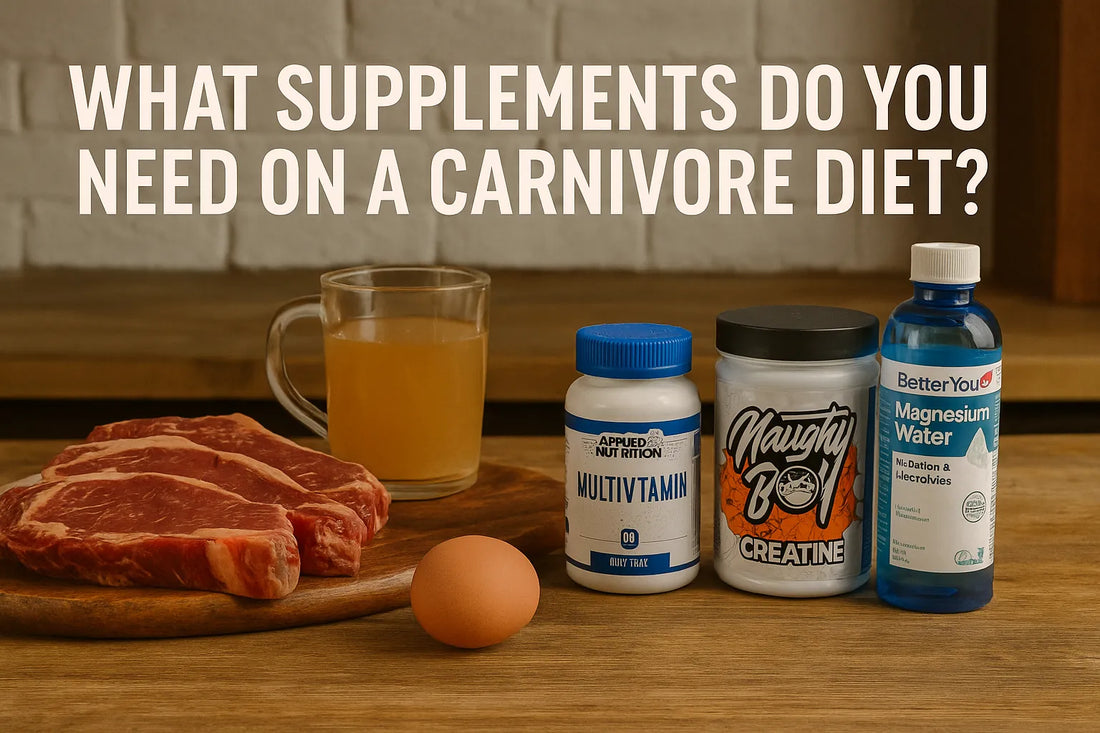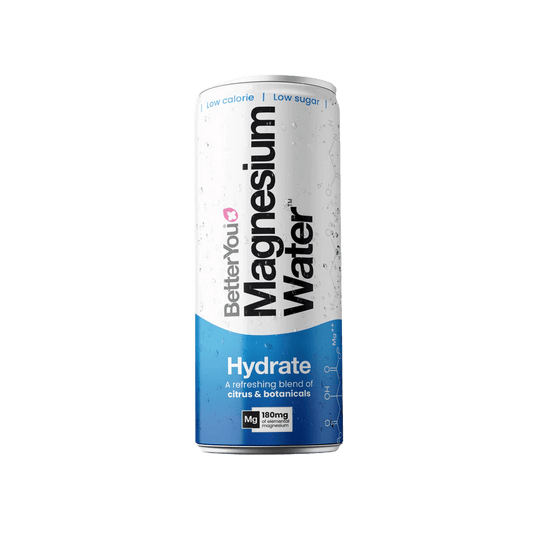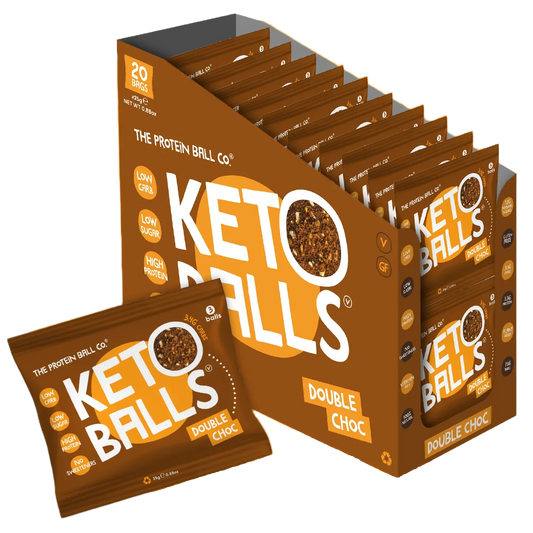The carnivore diet is one of the most extreme nutritional approaches out there: a regimen built almost entirely around animal products, cutting out vegetables, grains, legumes, and fruits. For some, it feels like a radical reset. For others, it’s the ultimate elimination diet to calm autoimmune issues, fix digestion, or simplify eating.
But as anyone who has experimented with carnivore knows, questions soon creep in:
Am I missing out on vitamins? What about electrolytes? Can I train properly without carbs? And do I actually need supplements if I’m already eating plenty of steak, eggs, and salmon?
That’s where a smart supplement strategy comes in. Carnivore can deliver plenty of protein and fat, but gaps in micronutrients, electrolytes, and training fuel can stall progress or leave you feeling drained. In this guide, we’ll break down the most important supplements for a carnivore diet, why they matter, and how to use them to feel and perform your best.
We’ll also spotlight real products like Supplement Needs Omega 3, BetterYou Magnesium Water, Naughty Boy Prime Creatine, Per4m Whey Hydrate, The Protein Ball Co Keto Balls, and Applied Nutrition Multivitamin to show you how each can fit into a carnivore lifestyle.
Do You Need Supplements on a Carnivore Diet?
The carnivore diet is nutrient-rich in some areas and lacking in others.
On the plus side, it provides:
-
High-quality protein from meat, fish, and eggs.
-
Vitamin B12 and heme iron in abundance.
-
Plenty of zinc, creatine, and carnitine for muscle and metabolism.
But carnivore can fall short in:
-
Electrolytes (magnesium, potassium, sodium) — easily depleted without fruits and veg.
-
Omega-3 balance — especially if you don’t eat fatty fish daily.
-
Vitamin C and other antioxidants — limited without plant foods.
-
Vitamin D — tricky to maintain without sunlight or supplementation.
-
Fiber — absent without plants, which can impact digestion.
So, while carnivore can sustain you in the short term, it’s difficult to cover all nutritional bases without supplementation. Think of supplements not as a contradiction to carnivore, but as a tool for longevity, performance, and recovery.

What Vitamins and Minerals Are Most Likely Deficient on a Carnivore Diet?
If you’re eating only meat, eggs, and dairy, you’ll naturally cover certain nutrients while missing others.
-
Vitamin C: Critical for collagen formation, immune health, and energy. Some argue fresh meat contains trace amounts, but for optimal levels, supplementation helps.
-
Magnesium: Crucial for muscle contraction, sleep quality, and heart health. Normally abundant in leafy greens, it’s scarce on carnivore.
-
Potassium: Regulates blood pressure, prevents cramps, and supports hydration — but largely absent without fruits/veg.
-
Fiber: While not technically a vitamin, its absence can affect digestion. Some carnivores adapt well, but others experience sluggishness without it.
-
Vitamin D: While you’ll get some from eggs and fatty fish, most people in the UK need supplementation — especially in winter.
-
Omega-3s: Unless you’re eating wild salmon daily, the omega-6/omega-3 balance tends to skew unfavourably on carnivore.
This is where a well-rounded multivitamin like Applied Nutrition Multivitamin comes in. It covers the bases, providing a safety net of essential vitamins and trace minerals that might otherwise be missing. It’s a daily “insurance policy” that keeps your micronutrient intake balanced.
How Do You Get All Your Vitamins on a Carnivore Diet?
The truth is, you probably can’t — not without help. While liver, eggs, and fatty fish are nutrient-dense, they don’t cover the full spectrum.
That’s why pairing carnivore with targeted supplements is smart. For example:
-
Applied Nutrition Multivitamin provides vitamin C, D, B-complex, and zinc to fill gaps.
-
Supplement Needs Omega 3 balances fatty acids, supporting heart and brain health.
-
BetterYou Magnesium Water replaces electrolytes lost through sweat and carb restriction.
With these three cornerstones — multivitamin, omega-3, and magnesium — you’ve got a solid foundation for micronutrient sufficiency.
Do You Need Vitamin D on a Carnivore Diet?
Absolutely. Even if you eat salmon and eggs regularly, it’s unlikely you’ll reach optimal vitamin D levels through diet alone. And since vitamin D acts more like a hormone regulator than a vitamin, it’s essential for:
-
Bone density
-
Muscle recovery
-
Immune health
-
Hormone balance
Carnivore or not, if you live in the UK, you need vitamin D supplementation — particularly during the autumn and winter months. The Applied Nutrition Multivitamin provides D3, the form your body uses most effectively.
How Do You Get Electrolytes on Carnivore?
One of the biggest challenges of carnivore (and keto alike) is electrolyte imbalance. Without carbs, insulin levels stay low, which means the kidneys flush sodium and water more quickly. That leads to what many call “keto flu” — headaches, cramps, fatigue, and dizziness.
The fix? Deliberately replacing electrolytes.
-
Magnesium: Essential for muscle function, sleep, and recovery.
-
Sodium: Can be boosted with salt, but balance is key.
-
Potassium: Crucial but harder to source from meat.
This is where BetterYou Magnesium Water shines. It’s a simple, refreshing way to top up magnesium while supporting hydration and performance. Pairing it with added salt and electrolyte powders ensures you feel sharp, not sluggish.
Do You Need a Fiber Supplement on Carnivore?
This is one of the most debated points. Some carnivore advocates argue fiber is unnecessary and that digestion adapts without it. Others experience constipation, sluggish digestion, or discomfort without fiber.
If you’re in the latter camp, consider integrating The Protein Ball Co Keto Balls. While they’re not a fiber powerhouse, they provide a keto-friendly, low-carb snack option that brings balance and variety — especially if you need a break from purely meat-based meals. They also satisfy sweet cravings without throwing you out of ketosis.
Do You Need Protein Powder or Creatine on a Carnivore Diet?
Protein itself won’t be lacking on carnivore — but convenience might be. If you’re on the go, cooking steak for every meal isn’t realistic. That’s where Per4m Whey Hydrate comes in: a fast, effective protein shake to keep muscle protein synthesis ticking along.
As for creatine, even though meat contains some naturally, most athletes benefit from supplementation. Naughty Boy Prime Creatine ensures consistent strength, recovery, and performance, especially important if you’re training hard while low-carb. It’s also one of the most studied and safest supplements available.
Why Am I Not Losing Weight on the Carnivore Diet?
Carnivore can be effective for fat loss, but it’s not magic. Common reasons people stall include:
-
Eating too many calories (yes, ribeye can still push you over).
-
Not tracking portion sizes.
-
Lack of electrolytes leading to water retention.
-
Inconsistent sleep and recovery.
Adding creatine and omega-3 won’t directly cause fat loss, but they support muscle retention and metabolic health — which indirectly keeps fat loss on track.

How Long Should You Stay on the Carnivore Diet?
This depends on your goals. Some use carnivore for a 30-day reset; others commit long term. But the longer you stay on it, the more important supplementation becomes. Over months, deficiencies in magnesium, vitamin D, and omega-3s compound.
That’s why building your stack around Applied Nutrition Multivitamin, Supplement Needs Omega 3, BetterYou Magnesium Water, Naughty Boy Prime Creatine, Per4m Whey Hydrate, and The Protein Ball Co Keto Balls ensures you’re covering your bases, whether you’re experimenting short-term or going all-in long-term.
Part 1 Wrap-Up
The carnivore diet is powerful in its simplicity — but it isn’t perfect. By stripping down your food choices, you also strip away nutrients that support recovery, focus, and energy. Supplements fill that gap, ensuring your diet isn’t just about survival, but about thriving.
In Part 2, we’ll go deeper into questions like:
-
Can you eat too much protein on carnivore?
-
What should you drink? (Is coffee really allowed?)
-
What to eat in the first week for success.
-
And the 80/20 rule for long-term sustainability.
What Supplements Do You Need on a Carnivore Diet? (Part 2)
Can You Eat Too Much Protein on a Carnivore Diet?
One of the biggest misconceptions around carnivore is that you can eat unlimited amounts of protein without consequence. While protein is the backbone of this diet, balance between protein and fat is key.
If your protein intake gets too high without enough fat, you may experience:
-
Low energy (since fat is the main energy source on carnivore).
-
Digestive stress (too much protein at once can overwhelm digestion).
-
Glucose spikes from gluconeogenesis (where excess protein converts into glucose).
So where do supplements fit in here? Creatine is a prime example. By topping up creatine with Naughty Boy Prime Creatine, you enhance muscle energy and recovery without having to push protein intake even higher. This means you can stay within a balanced ratio while still fuelling training performance.
What Can You Drink on Carnivore (Is Coffee Allowed)?
A strict carnivore diet allows only animal products, which means beverages are typically water, bone broth, or milk (if tolerated). But let’s be real — many modern carnivore followers still enjoy coffee, tea, or electrolytes.
-
Water: Your foundation — hydration matters even more on low-carb diets.
-
Electrolyte drinks: A necessity for energy and hydration balance. This is where BetterYou Magnesium Water comes in — it delivers crucial electrolytes in a simple, refreshing way.
-
Coffee: While not technically carnivore, most people allow it in moderation. Black coffee can boost energy and focus, especially when sleep-deprived.
-
Protein shakes: While not “strict” carnivore, something like Per4m Whey Hydrate can make life easier for athletes and gym-goers who don’t want to grill meat after every workout.
If you’re taking the diet for strict autoimmune purposes, you may cut out coffee entirely. But for performance and practicality, keeping it in moderation can work.
What Dairy Is Allowed on a Carnivore Diet?
Dairy is a grey area. Many carnivore eaters include butter, cheese, cream, or yogurt. Others cut it entirely due to lactose intolerance or inflammatory responses.
If you tolerate dairy well, options like hard cheeses, Greek yogurt, or cottage cheese can provide added calcium, probiotics, and variety. If you don’t, supplements can make up the shortfall:
-
Applied Nutrition Multivitamin for calcium and vitamin D.
-
Supplement Needs Omega 3 to reduce inflammation, especially if dairy gives you bloating or digestive upset.
That way, even if you skip dairy entirely, you won’t miss out on nutrients.

What Should I Eat in the First Week of the Carnivore Diet?
The first week of carnivore is notoriously tough. Energy slumps, cravings, and digestive changes often hit as your body adapts. To make the transition smoother:
-
Prioritise fatty meats like ribeye, salmon, and eggs — not just lean protein.
-
Salt your food generously to combat electrolyte loss.
-
Keep snacks handy — this is where The Protein Ball Co Keto Balls can be a lifesaver. They give you a keto-friendly way to handle cravings without derailing progress.
-
Stay hydrated and add electrolytes with BetterYou Magnesium Water.
Supplements during the first week can truly determine whether you feel “carnivore flu” or power through the adaptation.
What Is the 80/20 Rule for the Carnivore Diet?
Some people find strict carnivore unsustainable long-term. That’s where the 80/20 approach comes in:
-
80% of your diet is meat, fish, eggs, and animal products.
-
20% allows room for low-carb extras like berries, herbs, or keto-friendly snacks.
This approach gives you flexibility while still harnessing the benefits of carnivore. For example:
-
Using Per4m Whey Hydrate as a convenient protein boost.
-
Adding The Protein Ball Co Keto Balls occasionally to manage cravings.
-
Supporting nutrient balance with Applied Nutrition Multivitamin so you’re covered whether you’re 100% strict or leaning toward flexibility.
The 80/20 rule isn’t about breaking the diet — it’s about making it sustainable and realistic for everyday life.

Can You Lose 20 Pounds on the Carnivore Diet?
Yes — but like all fat loss strategies, it depends on calorie balance and consistency. Carnivore simplifies food choices, which often makes eating fewer calories easier. But the diet alone won’t guarantee weight loss.
Key factors that make the difference:
-
Deficit: Even ribeye and bacon can push you over calories if you don’t moderate portions.
-
Electrolyte balance: Without magnesium, sodium, and potassium, water retention can mask fat loss.
-
Muscle retention: Using Naughty Boy Prime Creatine helps maintain strength and muscle mass, preventing the dreaded “skinny fat” look.
-
Metabolic health: Omega-3s from Supplement Needs Omega 3 keep inflammation down and fat metabolism strong.
Paired with smart supplementation, 20 pounds in a few months is realistic — but it’s not automatic.
How Long Should You Stay on the Carnivore Diet (and Heal the Gut)?
Some use carnivore as a 30-day elimination diet to reset digestion and identify trigger foods. Others go long-term. The key is monitoring your energy, blood work, and gut health.
-
In the short-term, carnivore can clear up bloating, food sensitivities, and inflammation.
-
In the long-term, the risks of deficiencies increase unless you supplement.
That’s where a daily stack comes in:
-
Applied Nutrition Multivitamin for baseline coverage.
-
BetterYou Magnesium Water for electrolytes.
-
Supplement Needs Omega 3 for anti-inflammatory support.
-
Naughty Boy Prime Creatine for gym performance.
-
Per4m Whey Hydrate for protein convenience.
This foundation allows you to reap carnivore’s benefits while avoiding the nutritional pitfalls that emerge over time.
FAQs: Carnivore Supplements and Performance
1. Do you need supplements on a carnivore diet?
Yes. While carnivore covers protein, zinc, and B12, it often lacks electrolytes, vitamin C, vitamin D, and omega-3s.
2. What’s the most important supplement for carnivore beginners?
Magnesium and electrolytes — without them, energy crashes and cramps can make the diet miserable.
3. Can creatine help on a carnivore diet?
Yes. Even though red meat has creatine, supplementation with Naughty Boy Prime Creatine ensures consistent strength and recovery.
4. Do I need vitamin D if I’m eating fish and eggs?
Most likely, yes. The UK climate means sunlight exposure is limited, so a multivitamin with vitamin D3 is crucial.
5. Should I use a protein powder if I’m already eating meat?
For convenience, yes. Per4m Whey Hydrate makes it easy to hit protein targets without constant cooking.
6. What snack options fit into a carnivore diet?
Strict carnivore snacks are things like jerky or boiled eggs. If you’re flexible, The Protein Ball Co Keto Balls are a low-carb way to break monotony.
7. Can omega-3 supplements improve results on carnivore?
Definitely. Supplement Needs Omega 3 balances fatty acids, supporting heart, brain, and joint health.
8. Do I need fiber supplements on carnivore?
Not always. Some adapt fine without fiber, others struggle. If digestion feels sluggish, experiment with keto-friendly snacks or increase hydration and electrolytes.
9. Can I drink coffee on carnivore?
Technically no, but many do. It won’t ruin your progress unless you’re following carnivore for strict autoimmune elimination.
10. How do I know if I should quit carnivore?
If you’re constantly fatigued, struggling with deficiencies, or find it unsustainable, consider switching to the 80/20 approach.
Conclusion: Smarter Carnivore with Supplements
The carnivore diet can feel empowering — simple, primal, and effective. But without smart supplementation, it risks leaving you deficient, tired, and underperforming.
That’s why the smartest carnivore followers build their routine around strategic, evidence-backed supplements:
-
Applied Nutrition Multivitamin for overall coverage.
-
Supplement Needs Omega 3 to balance fatty acids.
-
BetterYou Magnesium Water for hydration and recovery.
-
Naughty Boy Prime Creatine for performance and strength.
-
Per4m Whey Hydrate for convenience.
-
The Protein Ball Co Keto Balls for flexible, low-carb snacking.
Carnivore may be restrictive in food, but with the right supplements, it doesn’t have to be restrictive in performance.





